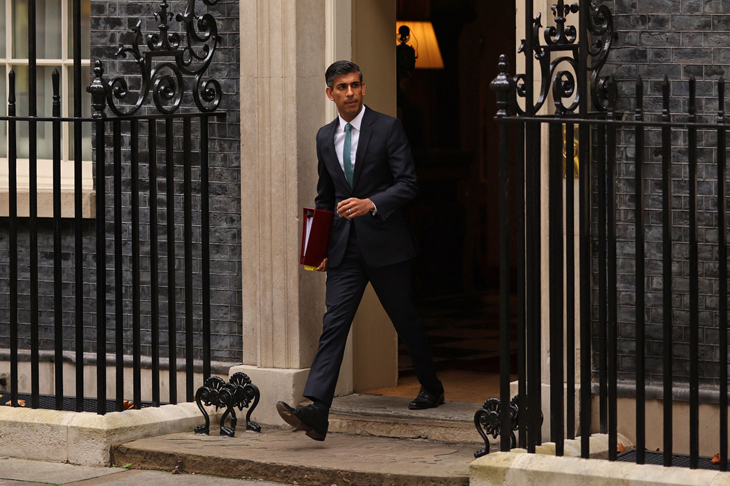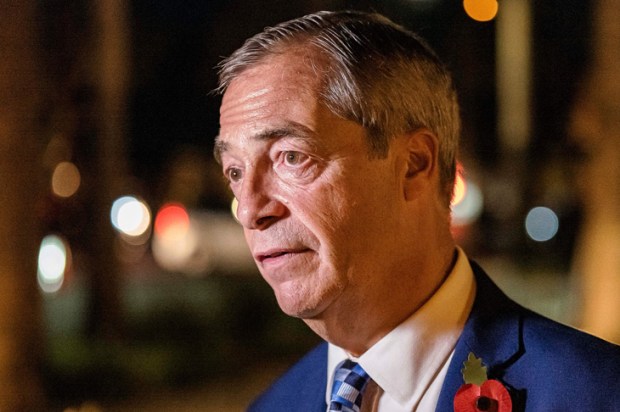‘Italy without the good food or weather,’ the tabloids screeched, as Britain switched to its fifth prime minister in six years. While a tad unfair to British food these days, the headlines highlighted the despair over the seemingly endless political chaos.
The high hopes that Liz Truss would correct the high taxes and soggy Green leftism of the Johnson era imploded amid poor political strategy. Initial applause for her chancellor Kwasi Kwarteng’s announcement of radical tax cuts dissipated with market concerns that they would add at least £70 billion to already sky-high post-Covid debts. Kwarteng claimed the tax cuts’ impact on debt would be reduced by stronger growth and spending cuts. But, fatally, the delayed full explanation of the strategy caused the pound and stock market to plunge. Kwarteng’s failure to anticipate this led to his sacking, followed by one of the more bizarre moments in recent British politics when Truss replaced him with Jeremy Hunt, who immediately rubbished her policies. Adding to the chaos, she then reversed her commitment to reducing Britain’s out-of-control immigration, pressuring Home Secretary Braverman to fiddle with rules to increase immigration numbers and so make economic growth forecasts look better.
Can ‘Rashi Sanook’, as President Biden called Britain’s latest prime minister, improve on that performance ? In contrast to Truss’s sunlit uplands of lower taxes, Sunak offers stern Treasury orthodoxies rejecting tax cuts any time soon and foreshadowing probable double-digit spending cuts plus real cuts to pensions. He hopes to balance this bleak prospect with other policy changes attractive to the Tory base.
Although Tory leaders by now have a well-earned reputation for campaigning as no-nonsense conservatives and then governing as limp social democrats, Sunak could prove more promising than the bland technocrat he often seems. Aside from repairing Britain’s finances, he wants three areas fixed – the police, immigration and the NHS. On the police, Sunak criticises their wokery and says they ‘must be fully focused on fighting actual crime’.
These views coincide with those of the able, reappointed Home Secretary Suella Braverman, who secured Sunak’s victory by delivering him the Tory Right’s votes.
Sunak and Braverman are also determined to end cross-Channel illegal immigration. Sunak describes illegal immigration as an ‘emergency’ and has echoed Australia’s policy that those who enter the country illegally can’t remain. Braverman has also committed to reducing legal immigration, which has been running at an unsustainable hundreds of thousands a year since Tony Blair was in office. Sunak has also promoted rising right-wing star Kemi Badenoch to take on the equalities brief, allowing her to attack the wokerati on issues such as radical gender ideology. Sunak allies say he opposes trends to erase women via gender-neutral language and plans a manifesto for women’s rights.
Yet the obstacles to change in these areas are formidable. The British bureaucracy is astonishingly resistant to ministerial directions it doesn’t like. The police have been told previously to correct course but continue to dance the macarena at gay pride events and to treat climate lunatics who cause traffic chaos with absurd gentleness – while aggressively pursuing people for ‘misgendering’ others on Twitter. The Home Office bitterly opposes tough border policies and The Spectator Australia can reveal that one of its senior legal officers recently boasted at a social event that officials would subvert government policy by coaching any asylum-seekers due for offshore assessment in Rwanda on how to avoid being sent there. Much of the British media and commentariat similarly oppose robust immigration controls – and this is the real reason for the Left’s demented hysterics over Braverman’s ‘security breach’, which amounted to her sending a draft ministerial statement to another MP from a private email account, a hardly national security-threatening matter for which she nevertheless apologised and resigned. The stakes are very high on this issue. If the immigration chaos continues on the Tories’ watch, much of their voter base will desert the party at the next election.
Fixing what Lord David Frost calls Britain’s ‘Soviet health service’ makes sorting out Sunak’s other tasks seem simple. Governments have long run away from trying to reform the UK’s £192 billion a year secular church, with its 1.2 million staff. Still, Sunak must ensure patients are able to see doctors, cut often huge delays for treatment and improve often woeful ambulance response times. He could make a useful start by cutting the £40 million a year the NHS spends on 800 ‘diversity officers’ – which would fund an extra 1,200 nurses.
Prospects for the future of Britain’s net- zero agenda are murkier. Sunak before he became prime minister echoed establishment climate zealotry – proposing green taxes on fuel, opposing Truss’s plan to cut green taxes on energy bills and decreeing eco-taxes on long-haul flights. And he’s now reinstated the ban on fracking. Still, he’s committed to building new nuclear power stations and has hinted that UK climate policy won’t be the Greta Thunberg tribute act it was under Johnson: both Cop 26 president Alok Sharma and climate minister Graham Stuart have been demoted, now excluded from Cabinet meetings; and it’s confirmed that the King also won’t be attending, despite his earlier wish to do so.
The fact that the Tories have produced Britain’s first non-white prime minister – on top of three women prime ministers – has wrong-footed the Labour party. Sunak’s background will make it awkward for Labour or the media to accuse him of racism, their default response to tougher immigration policies. But Labour will have fertile political ground when contrasting austerity with Sunak’s huge wealth (in the order of £730 million). Sunak will need to work hard to dispel the idea that he’s ‘Davos Man’, most comfortable in the company of financiers and bankers.
Despite their poor current polling, with probably at least two years until the next election, the Tories could still turn things around.
This requires not only laying the groundwork for an improving economy but highlighting Labour’s hard-left agenda in many areas, especially open borders, soft policing and reversals of women’s rights. If Sunak’s actions match his words, the Tories will still be in with a chance.
Got something to add? Join the discussion and comment below.
Get 10 issues for just $10
Subscribe to The Spectator Australia today for the next 10 magazine issues, plus full online access, for just $10.
You might disagree with half of it, but you’ll enjoy reading all of it. Try your first month for free, then just $2 a week for the remainder of your first year.














Comments
Don't miss out
Join the conversation with other Spectator Australia readers. Subscribe to leave a comment.
SUBSCRIBEAlready a subscriber? Log in